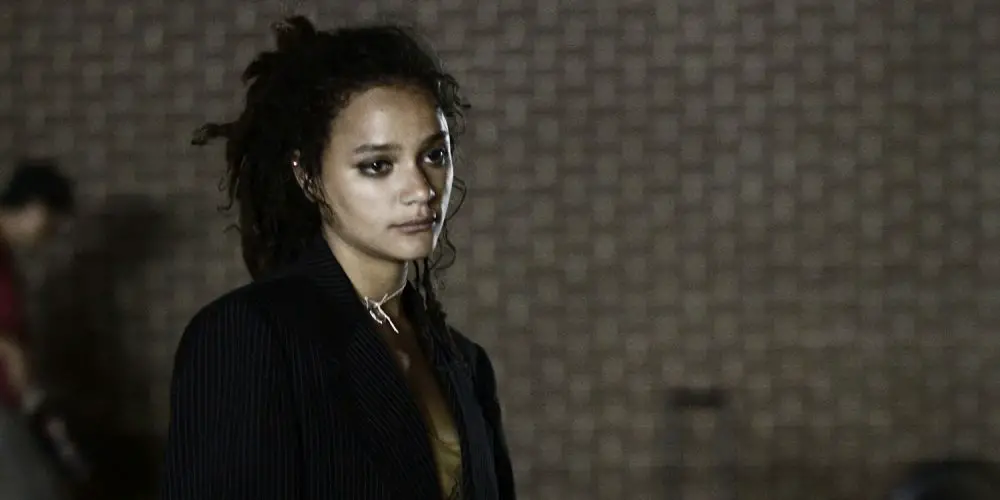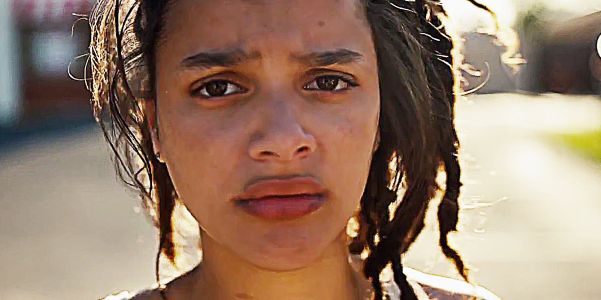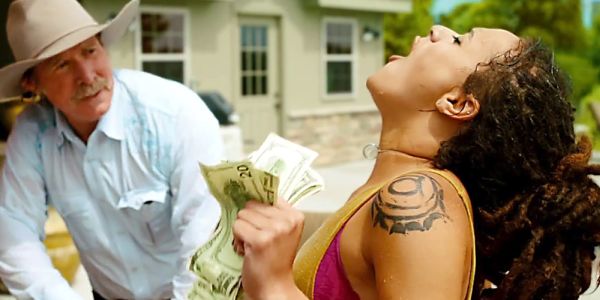AMERICAN HONEY: A Road Trip Without A Destination

Alistair is a 25 year old writer based in Cambridge.…
Andrea Arnold is without a doubt cinema’s leading creator of stories depicting the trials and tribulations of working class women, with an entirely non-judgemental eye. Translating her social realist style across the Atlantic, keeping the inherent themes relevant to the lower classes intact, would seem close to impossible, although due to an unfortunate stroke of luck, the Presidential election has made the general idea of class in an overwhelmingly middle class country relevant yet again.
Many audiences have been so transfixed by the way Arnold and her long-term cinematographer Robbie Ryan have captured the sweeping vistas of America, a world completely alien to the council estates of earlier films Red Road and Fish Tank, that they have seemed to ignore the fact this is unmistakably a distinctive piece of work.
The comparisons to the works of Larry Clark and Harmony Korine are unfounded, names dropped simply as this is a snapshot of a jaded youth culture that doesn’t fit into mainstream norms. Arnold is different to those problematic auteurs in that she depicts the reckless hedonism with a sense of empathy, a commendable decision, albeit one that ensures American Honey is easy to admire but close to impossible to actually like.
From Working Class Britain to America- Same Style Intact
American Honey’s story follows Star (newcomer Sasha Lane), an 18-year-old girl in a working class nowhere town in some indistinctive corner of the Midwest. Poor and without a job, she scavenges for food in bins to feed her younger siblings, due to an alcoholic, abusive father at home and a mother with no interest in raising them elsewhere in the city. When at a K-Mart one day, she sees Jake (Shia LaBeouf) and his large crew, becoming immediately transfixed. He offers her a role as part of this posse, travelling across the country and making a living selling magazine subscriptions. Home is but a memory, with her life now lived entirely attempting to sell to middle class suburbs where she could never fit in.
Despite boasting a giant ensemble cast of eccentric characters, Arnold’s screenplay decides to focus entirely on Star, helping to see the country through the eyes of an outsider who feels like she’ll never fit in with American society. Although this means we get a strong central performance from Sasha Lane, the very definition of a star-making role, it means the end result is a close to three hour stretch populated by characters who mostly exist as mere archetypes. They may always be central in the frame, yet they end up being so peripheral in the viewer’s imaginations, it is hard to imagine anybody claiming the supporting roles made an impression.

American Honey doesn’t feel like a snapshot of a vibrant youth culture as many have claimed, because it is so poorly characterised. The majority of the cast are viewed only sitting in a van, singing along to rap music, in some of American Honey‘s most tedious sequences. It feels realistic, but if that’s the major generational insight, then society has raised the current generation to be incredibly boorish, in spite of the party lifestyle portrayed elsewhere.
On the other hand, you could easily view the role of Star as a clear cipher for Arnold: an outsider looking into this culture, who will never truly be able to get under the skin of those around her. Only when viewed metatextually is the flat characterisation forgivable; otherwise, we are subjected to three hours in the company of people we’ll never relate to by design. When they do talk, it’s in a mumblecore style where five people speak in vague terms simultaneously. Again, it feels realistic to large group conversations, but only shows youth culture as vibrant in that multiple kids are speaking at once.
With the blaring rap beats on the soundtrack, the contrived excursions to visit cowboys and other archetypes symptomatic of an America long gone, as well as on the nose dialogue such as “I feel like America”, the major criticism of the American Honey is that it is trying too hard to be the movie of this generation. Compared to recent movies as varied as Hell or High Water and Don’t Breathe, which offered snapshots of working class desperation at the end of Obama’s tenure in the White House, American Honey has no social commentary on its mind. It may depict the differences between the classes, often in lurid ways, yet never makes a statement on anything.

Themes of capitalism, class and a fading way of life are all inherent to this story. Arnold feels reluctant to make them the topic of conversation, yet feels willing to play into tiresome youth movie cliches elsewhere. All this does is channel earlier, better road movies. A penultimate sing along to the country song American Honey movie derived its title from (a song which, after 2 hours and 45 minutes of build up, reveals itself to be god awful) is a shameless retread of the Tiny Dancer sequence from Almost Famous. Without an equally majestic song on the soundtrack, the magical realism Arnold aims for in this sequence becomes an instant fail.
An Often Infuriating Waste of Potential
If this all seems like damning, with a few glib shots at faint praise, then that couldn’t be further from the truth. The infuriating thing about American Honey is that there are plenty of great things about it, but when stretched out to an incomprehensibly epic length, it is hard to see it as anything other than wasted potential.
However, there is one bit of social commentary lodged into American Honey that is entirely accidental but pays off in rewarding ways. When Jake, the character played in a career best performance from walking meme Shia LaBeouf, is introduced, he describes his sense of style as “Donald Trump-ish”.
At the time of filming in summer 2015, before the looming horrors of the most far right presidential election in history, such a quip was clearly designed to invoke his capitalistic salesman aspirations. Now, it helps render him automatically unlikable (something LaBeouf portrays with relish), even foreshadowing many revelations about Trump in weird ways. He is a notorious serial liar, who will say anything to get the sale and keep personal turmoil to a minimum, whilst elsewhere it is alleged that he tries to sleep with every woman who joins the crew; you could even see his actions as being forceful towards Star, even if she consents.
The parts of the movie that are successful all hark back to earlier narratives in Arnold’s films. Her Academy Award winning short film Wasp is evoked due to the establishing set-up between Star and her siblings scavenging to get food, all because of a reckless mother who has left them to try sweet talk another man. This is the entire crux of that short movie, all distilled into an opening ten minutes that hit an emotional punch the rest of American Honey never fully achieves.

Stylistically, that short is also evoked due to Arnold’s fondness for using questionable music choices diegetically; there, it was cheesy pop hits (no other Academy Award winning piece of work has Hey Baby by Dj Otzi on the soundtrack), here, it is rap songs with lyrics like “pussy for breakfast, that’s how I start my day. My dick is a pen, it’s written all over her face”.
Her 2009 film Fish Tank is also evoked in the narrative, as the questionably aged central relationship (where we see only two thirds of a love triangle) immediately recalls the devastating breakdown of a sexual relationship between a 15 year old girl and her mum’s boyfriend, played by Michael Fassbender.
There are also hints of her Wuthering Heights adaptation, in that cinematographer Robbie Ryan has adopted a Terrence-Malick-meets-Ken-Loach approach, with the dark greys of that film replaced by retina scorching Mid Western sunshine here. Ryan proves himself to be one of Britain’s most adaptable cinematographers; this week, he’s seen visually displaying a vibrant America, whereas next week he’s back portraying a miserable Newcastle estate with Loach.
The only Arnold movie this doesn’t have a thematic or stylistic connection with is her debut Red Road. That feature length subversion of Brian De Palma-style tropes of obsession began a trend to depict sexuality in bleak terms in her movies, where all scenes in the bedroom are portrayed from a female perspective and appear defined by premature ejaculation.
There may be hints of that in a prostitution sequence here, although for the most part she uncharacteristically portrays sex as passionate and enjoyable. There may be bleak elements in the way Arnold sees America, but millennial sexuality is not disturbing in the same way it would be in the Larry Clark movies to which this has been inexplicably compared.
Conclusion
For an epic length movie that tries to define a generation, American Honey misses the mark phenomenally, wasting all the potential that is clearly on screen. Anchored by two great performances, it is still a road trip worth taking, you’ll just feel like you’ve taken a long detour and got lost on the way, instead of driving straight to the destination.
If American Honey isn’t the defining movie of this generation, what is?
American Honey is in UK and US cinemas now. All international release dates are here.
Does content like this matter to you?
Become a Member and support film journalism. Unlock access to all of Film Inquiry`s great articles. Join a community of like-minded readers who are passionate about cinema - get access to our private members Network, give back to independent filmmakers, and more.
Alistair is a 25 year old writer based in Cambridge. He has been writing about film since the start of 2014, and in addition to Film Inquiry, regularly contributes to Gay Essential and The Digital Fix, with additional bylines in Film Stories, the BFI and Vague Visages. Because of his work for Film Inquiry, he is a recognised member of GALECA, the Gay & Lesbian Entertainment Critics' Association.













